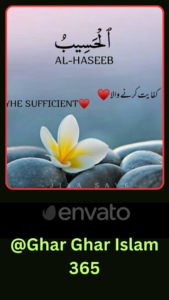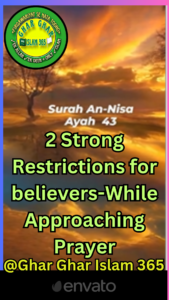2 Strong Restrictions for believers-While Approaching Prayer
2 Strong Restrictions for believers-While Approaching Prayer
Islamic teachings encompass all aspects of life, providing guidance through the Quran and Hadith on how Muslims should conduct themselves. Surah An-Nisa (4:43) is a pivotal verse that addresses several key issues, including the initial restrictions on alcohol before its complete prohibition, the rules regarding marital relationships, and the instructions on Tayammum (dry ablution). These topics reflect the gradual approach Islam takes in leading believers towards a life of purity, obedience, and spiritual awareness.
This descriptive note explores the various aspects of Surah An-Nisa (4:43), delving into the broader Islamic context by referencing other Quranic verses and Hadith, especially from the Qutub al-Sittah, to provide a comprehensive understanding of the restrictions on alcohol before its final prohibition, the regulations surrounding marital relations, and the rulings on Tayammum.
1.1 Gradual Approach to Prohibition in Islam
Islam’s approach to the prohibition of alcohol was gradual, reflecting a deep understanding of human nature and societal habits. Initially, alcohol was not entirely forbidden; instead, restrictions were introduced progressively to wean the believers off its consumption.
1.2 Surah An-Nisa Ayat 43: The First Restriction
Surah An-Nisa (4:43) addresses the believers directly:
“O you who have believed, do not approach prayer while you are intoxicated until you know what you are saying…”
This verse is the first explicit restriction on alcohol, forbidding Muslims from performing prayers while under the influence. The reason for this restriction was to ensure that worshippers were fully aware of their words and actions during prayer, as prayer (Salah) is a direct communication with Allah and requires complete mindfulness and sincerity.
1.3 The Second Stage of Restriction: Surah Al-Baqarah Ayat 219
Following this initial restriction, the Quran provided further guidance in Surah Al-Baqarah (2:219), which discusses the harm and benefits of alcohol:
“They ask you about wine and gambling. Say, ‘In them is great sin and [yet, some] benefit for people. But their sin is greater than their benefit.'”
This verse emphasizes the moral and social dangers associated with alcohol and gambling, indicating that the harmful effects outweigh any perceived benefits. This verse prepared the believers for the final stage of prohibition by highlighting the negative consequences of such behaviors.
1.4 Complete Prohibition: Surah Al-Ma’idah Ayat 90-91
The final and absolute prohibition of alcohol is found in Surah Al-Ma’idah (5:90-91):
“O you who have believed, indeed, intoxicants, gambling, [sacrificing on] stone alters [to other than Allah], and divining arrows are but defilement from the work of Satan, so avoid it that you may be successful.”
“Satan only wants to cause between you animosity and hatred through intoxicants and gambling and to avert you from the remembrance of Allah and from prayer. So will you not desist?”
These verses unequivocally declare the consumption of alcohol as haram (forbidden), linking it directly to the influence of Satan and the disruption of social harmony and spiritual devotion. The prohibition is final and comprehensive, covering all forms of intoxicants.
1.5 Hadith on the Prohibition of Alcohol
The Hadith literature, particularly the collections of Sahih Bukhari and Sahih Muslim, reinforce the Quranic prohibition of alcohol. One such Hadith states:
“Every intoxicant is Khamr (alcohol) and every Khamr is forbidden.” (Sahih Muslim)
Another Hadith narrated by Jabir ibn Abdullah highlights the seriousness of alcohol consumption:
“Whatever intoxicates in large quantities, a small quantity of it is also forbidden.” (Sunan Ibn Majah)
These Hadiths underscore the complete and unconditional prohibition of alcohol in Islam, emphasizing that any amount of intoxicant is harmful and forbidden.
2.1 Surah An-Nisa Ayat 43 and Marital Relations
In the same verse of Surah An-Nisa (4:43), marital relations are also addressed in the context of ritual purity:
“…nor in a state of Janabah (after sexual intercourse) except those passing through (a place of prayer), until you wash (your whole body).”
This part of the verse highlights the importance of ritual cleanliness, particularly after marital relations, before one can engage in prayer or other acts of worship. The state of Janabah requires a full-body purification, known as Ghusl, to restore spiritual and physical purity.
2.2 The Significance of Ghusl in Marital Life
Ghusl is an essential part of Islamic jurisprudence and is required in several situations, including after sexual intercourse, menstruation, and childbirth. It serves as a physical and spiritual cleansing process, ensuring that Muslims maintain a high standard of purity in their daily lives.
The importance of Ghusl is further emphasized in various Hadith. One such Hadith in Sahih Bukhari narrates:
“Allah’s Messenger (PBUH) said, ‘When a man sits between the four parts of a woman and has sexual intercourse with her, Ghusl becomes obligatory.'” (Sahih Bukhari)
2.3 Marital Relations as a Source of Reward
Islam views marital relations as not only permissible but also as a source of reward when conducted within the framework of marriage. The Prophet Muhammad (PBUH) said:
“In the sexual act of each of you there is a charity.” (Sahih Muslim)
This Hadith emphasizes that fulfilling marital obligations with love, respect, and mutual consent is considered a righteous act in Islam, contributing to the overall well-being of society.
2.4 The Balance of Rights and Responsibilities
Islam provides a balanced framework for marital life, ensuring that both spouses have rights and responsibilities. Surah An-Nisa (4:19) advises:
“…And live with them in kindness…”
This verse encapsulates the essence of marital life in Islam, which is built on mutual respect, love, and kindness. Both partners are encouraged to treat each other with compassion and fairness, fulfilling their duties with sincerity.
3.1 Introduction to Tayammum
Tayammum is an alternative to Wudu (ablution) and Ghusl (full-body purification) when water is unavailable or when using water poses a risk, such as during illness. Surah An-Nisa (4:43) provides the guidelines for Tayammum:
“…and if you are ill or on a journey or one of you comes from the place of relieving himself or you have contacted women and do not find water, then seek clean earth and wipe over your faces and your hands [with it]. Indeed, Allah is ever Pardoning and Forgiving.”
3.2 The Procedure of Tayammum
The procedure for Tayammum is simple and symbolic, reflecting the flexibility and compassion of Islamic law. It involves:
- Intention (Niyyah): The worshipper must intend to perform Tayammum as a substitute for Wudu or Ghusl.
- Striking the Earth: The worshipper strikes their hands lightly on clean earth, dust, or sand.
- Wiping the Face: The dust is then wiped over the face.
- Wiping the Hands: The dust is then wiped over the hands up to the wrists.
This symbolic act allows Muslims to maintain ritual purity even in difficult circumstances, emphasizing the importance of prayer and worship in all situations.
3.3 Conditions for Tayammum
Tayammum is only permissible under specific conditions:
- Lack of Water: When water is unavailable or insufficient for Wudu or Ghusl.
- Illness: When using water may harm a person’s health.
- Travel: During long journeys where water may not be accessible.
- Time Sensitivity: When the time for prayer is about to expire, and performing Wudu or Ghusl would cause a delay.
3.4 The Flexibility of Islamic Law
The allowance of Tayammum demonstrates the flexibility of Islamic law, which accommodates the diverse circumstances of believers. It reflects Allah’s mercy and the principle that religious duties should not impose undue hardship on individuals.
3.5 Hadith References on Tayammum
Several Hadiths provide further guidance on Tayammum, reinforcing its importance in maintaining ritual purity. One such Hadith narrated by Jabir ibn Abdullah states:
“The earth has been made for me (and for my followers) a place for praying and a means to perform Tayammum.” (Sahih Bukhari)
This Hadith highlights the universal accessibility of worship in Islam, ensuring that Muslims can perform their religious duties regardless of their circumstances.
Surah An-Nisa (4:43) offers profound insights into several critical aspects of Islamic life, including the gradual prohibition of alcohol, the significance of marital relations and Ghusl, and the rulings on Tayammum. These teachings reflect Islam’s comprehensive approach to guiding believers in every aspect of life, ensuring that their spiritual and physical well-being is preserved.
By understanding and implementing these teachings, Muslims can lead lives that are not only pleasing to Allah but also beneficial to their communities. The gradual prohibition of alcohol shows the wisdom in addressing deeply ingrained habits, while the regulations on marital life and Tayammum demonstrate the balance and flexibility within Islamic law.
Related Topic Searches:-
#AlcoholProhibitionIslam #MaritalRelationsIslam #IslamicPurity #TayammumRules #SurahNisa #IslamicTeachings #QuranAndHadith #MuslimLife #QutubESitta #IslamicGuidance #IslamicLaw #SpiritualPurity #IslamicMarriages #IslamicWisdom #ProphetMuhammadTeachings #FaithAndPractice #IslamicHistory #IslamicPatience #TrustInAllah #short #shorts #ytshorts #youtubeshorts #viralshort #viralshort #viralvideo #viralshorts #viralreels #trend #trends #trendy #trending #trendingnow #trendingshorts #trendingshort #trendingyoutubeshorts #india #germany #netherlands #uk #usa #russia #saudiarabia #bangladesh #uae #egypt #morocco #malaysia #philipines #iraq #nepal #pakistan #allah #quran #hadees #surah #islam #prophetmuhammadﷺ #prophet #deen #dawah #bayan #viralbayan #emotionalbayan #engineer #drisrarahmed #muftitarikmasood #molanatarikjameel #muftimenk #ghargharislam365 #mdsir





